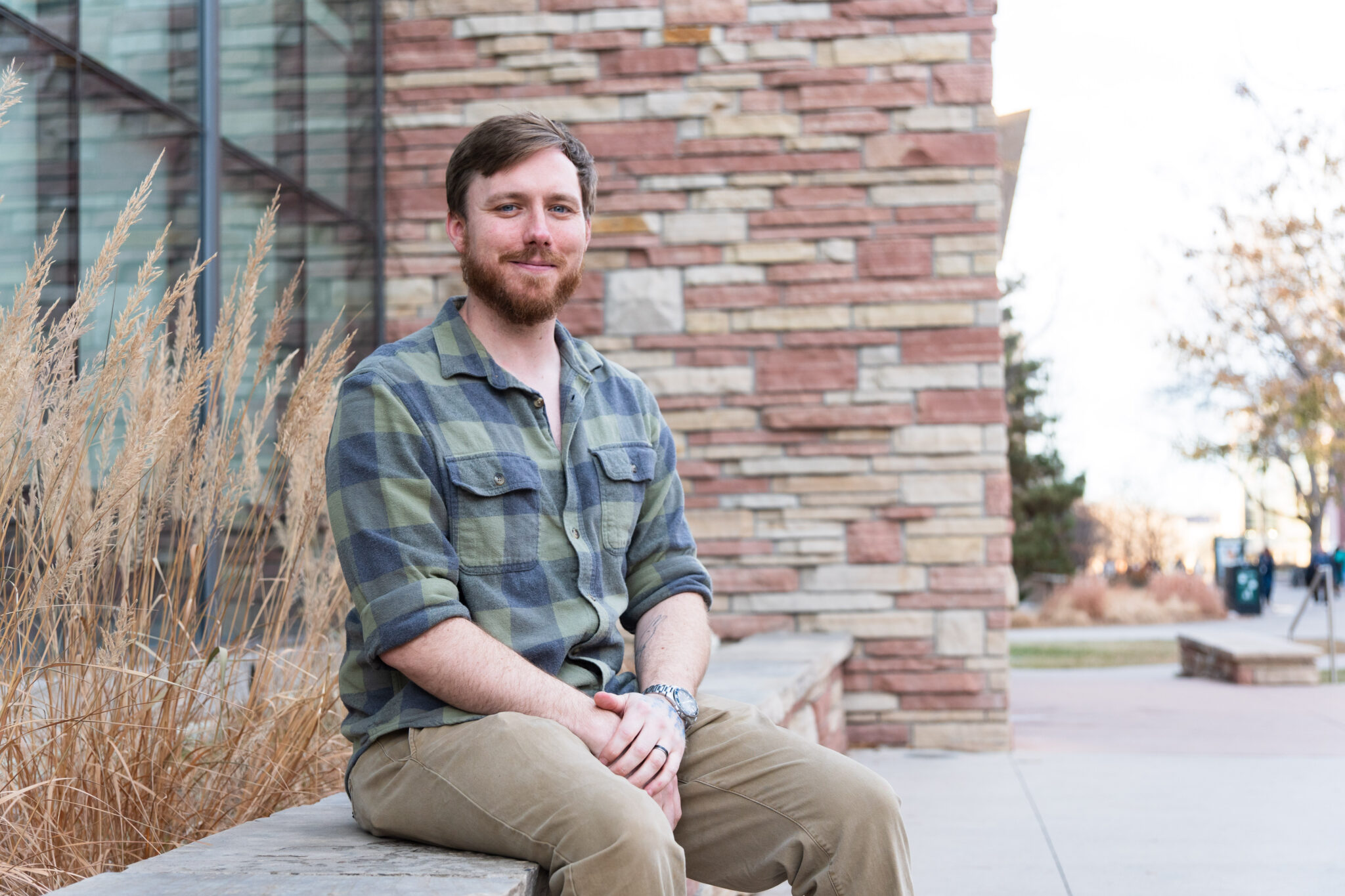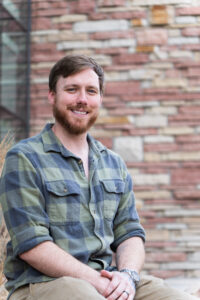
Ross Atkinson, a Ph.D. student in the Education, Equity, and Transformation Program in the Colorado State University School of Education, received the 2023-24 Dean’s Fellowship to pursue his research on the impact of writing workshops for veterans. Read on to learn more about Atkinson’s personal journey as a veteran, discovering his love of education, and dedicating his research to bettering outcomes for veterans.
Tell us about where you are from and your undergraduate experience.
I grew up in the glamorous city of Las Vegas, Nevada. Growing up in Las Vegas is quite unique. It is a place where a young person can find all the trouble they can handle and more. I know because I found all the trouble there was to find. I ended up leaving my public high school to graduate through an adult education program because I disliked attending and wanted to get high school over with. Somehow it worked, and I graduated high school in 2008 and joined the U.S. Army as an enlisted communications specialist. I completed my basic training in Ft. Benning, Georgia in 2009 and was sent off to my first duty station in October of that year. I was destined for Ft. Huachuca in Sierra Vista, Arizona.
While at Ft. Huachuca, I enrolled in a local community college and was set up to start my first courses in the fall of 2010. The only problem is that I was set to deploy in the spring semester preceding my enrollment. So, I took my first college courses—SOC 101 and ENG 101—on a small, French-run forward operating base in northeastern Afghanistan in 2010. It was in these courses that I discovered a new love for education—a novel passion for learning. This new motivation to go to school was almost certainly a consequence of the extreme and challenging experiences I had while deployed. Regardless, I became a dedicated student from then on, and I took classes from that moment in Afghanistan until I left the service in 2012.
When I got out of the service, I enrolled at the University of Nevada, Las Vegas where I received a degree in Secondary Education to teach English at the middle and high school level. I taught for a short time and then applied to CSU’s English master’s program to seek more content knowledge and to become a better English teacher.
What inspired you to continue to graduate school at CSU and to apply for the Dean’s Fellowship?

I was first inspired to attend graduate school at CSU after visiting with a friend who was in the Department of Human Development and Family Studies Marriage and Family Therapy Program. I realized I could keep going to school to continue learning about the things I care about, while also living in a place like Fort Collins. So, I made the move right away from the materialistic world of Las Vegas to a new world filled with Subarus and Birkenstocks. While in the English master’s program, I helped form CSU’s Veterans Writing Workshop and have been a supporter in various ways ever since. It was the forming of this workshop that made me realize that I enjoyed both research and teaching, and I fell love with the act of creating and promoting something—like the workshop—that helps people; I fell in love with helping veterans tell their stories. Wanting to continue this work, I applied to the Education, Equity, and Transformation Ph.D. program through the School of Education and was accepted in the spring of 2019.
Getting into this Ph.D. program has allowed me to continue to support the workshop over the past six years. As a workshop, we have published two books and presumably supported hundreds of veterans and their families not only tell their stories but feel better about and have more control over how those stories are situated in their own lives. The amazing outcomes of this workshop inspired me to figure out exactly how it is supporting the veteran participants. This is the focal point of my Dean’s Fellowship and dissertation research. It is important to understand both if and how the writing workshop supports the well-being of its veteran participants. To really answer this question, I needed resources, which is why I applied to the Dean’s Fellowship three separate times during my time in the doctoral program to seek funding and support. Finally, after many years of combined work and proposals, I was awarded the fellowship.
Describe your research and its significance.
My research is aimed at examining both if and how experiential writing workshops for veterans support or constrain their well-being. An amazing tool was created in the last few years aimed at measuring various life factors that predict well-being across four life domains: Health, Finance, Vocation, and Social Relationships. The tool is called the Well-being Inventory (Vogt et al., 2018), and was designed to measure the life factors that predict an individual’s well-being. By measuring the change over time in the various factors that affect these domains, I hope to track the effect of the workshop on participant well-being when compared to a control group who will not receive the workshop treatment.
The significance of this research is tied to the challenges faced by many veterans in finding a place in civilian society after separation from the culture and community of the military. It is important to understand the transition from service member to civilian as more than a career change. For many veterans, separation from the service means the loss of their community and culture—their friends, home, routine, healthcare, and job—simultaneously. Then they enter a civilian workforce or educational institution where much of their cultural and vocational knowledge is untranslatable, and in many cases, not valued. The workshop creates a community space where this loss of culture can be openly discussed, alongside the other “untranslatable” parts of military service—the parts that famously veterans have explained as: “you wouldn’t understand.” This space gives veterans a place to write out their stories in a way that we understand as fellow veterans, and then together we send it out into the world to show others our understanding.
What do you hope will be the long-term impacts of your research?
This study works broadly to advance the national health, prosperity, and welfare of veterans and their families. Having markers of poor well-being has been associated with increased risk of homelessness, substance abuse disorders, suicidality, and anger and aggression, all of which already disproportionately affect veterans and their families when compared to their civilian peers. An overabundance of individuals facing these obstacles can burden local mental health and social service resources that are already strained in many communities around the nation. By providing actionable data around veteran community program use, well-being, and experiential writing workshops, this research will inform practices and policies around reintegration and federal transition assistance programs, thereby reducing strain on local resources.
I anticipate the study will highlight the effectiveness of a program like the writing workshop in supporting veteran well-being through local universities, community centers, and organizations like the VA. Writing workshops are not resource-intensive or logistically complex and are easy to begin. My hope is that by systematically examining both if and how experiential writing programs support well-being, I can provide evidence of a writing program model that not only supports veterans, but also vicariously supports veteran families, community members, and the local and national organizations that provide services for veterans.
How have your mentors helped to guide you throughout your career so far?
I cannot even begin to explain how the humans who I have listed as my mentors for this fellowship have helped me to get where I am today. I have four amazing people supporting me. The first is my doctoral advisor, Dr. Louise Jennings, who has been supporting my research interests since I entered the department in 2019, guiding me to the study that I am completing now. Over the past four-and-a-half years, I have traversed many possible topics for my dissertation research, but it was Dr. Jennings who saw that my engagement with the workshop was something I should be focusing on. She pushed me to look into various critical veteran perspectives as they pertained to the workshop, and this trajectory led me to examine veteran writing programs and well-being.
I met Dr. Sue Doe during my English M.A. She was one of my thesis committee members and one of the sponsoring faculty of the initial veterans writing workshop. Her contribution to my academic career is immeasurable. Prior to our meeting, I was looking into methods of English teacher professional development. After our first meeting, I had a different thesis topic that focused on student-veteran pedagogy, which ended up being a foundational part of my current research into veteran writing and well-being. Dr. Doe was a major catalyst in the decision to begin focusing my research on veterans and writing spaces.
Dr. David Most is one of three people who I can credit with my understanding of the quantitative side of research. I have been taking classes with Dr. Most since I was an English master’s student in 2018, and, since I come from the English field, Dr. Most had his work cut out for him trying to teach me any statistics. However, his patience and clarity in teaching gave me the confidence to try out new things and to learn through making mistakes. His welcoming attitude and calm demeanor while teaching humanities students, like me, that statistics is amazing was certainly instrumental in forming my understanding of quantitative research methods.
Last, but certainly not least, Dr. Ben Schrader is the current director of the CSU Adult Learner and Veteran Services, a combat veteran, an author for one of the largest writing workshops in the nation, Warrior Writers, and a veteran activist who researches veteran activism. Dr. Schrader has bent over backward to support the veteran writing workshop and my research over the last couple years, to include becoming an associate faculty of the School of Education to support me as a committee member during my study. Dr. Schrader’s history aligns almost perfectly with my research, allowing him to provide unique, nuanced, and invaluable insight into my study.
What are your future plans after earning your Ph.D.?
After graduation, I hope to work with either active military or veterans, teaching writing in some form. It would be amazing if some organization out there needed a full-time military-connected writing workshop facilitator; however, short of that, I could see myself in a university position that allows me to construct such a space—perhaps as a professor or as faculty in a veteran services department. In addition to writing and working with veterans, I am also a teacher and researcher. Workshop facilitation scratches the itch of teaching English quite well, but finding a position where I can continue my research into veteran well-being and writing would be amazing. But who knows, maybe I’ll graduate and open a brewery.
The School of Education is part of CSU’s College of Health and Human Sciences.